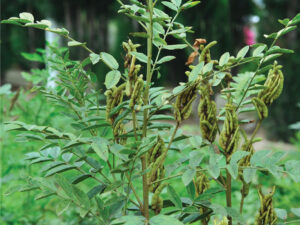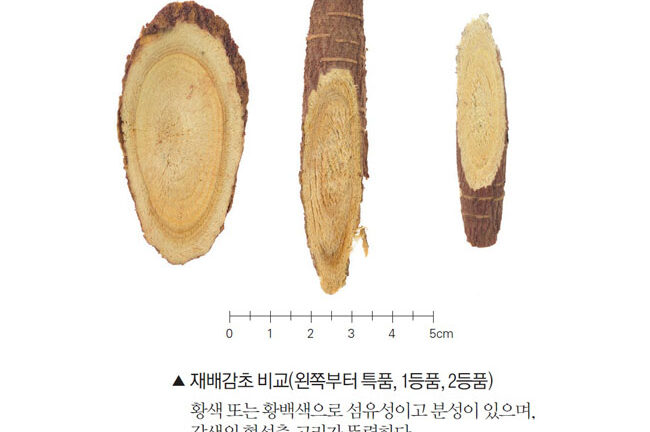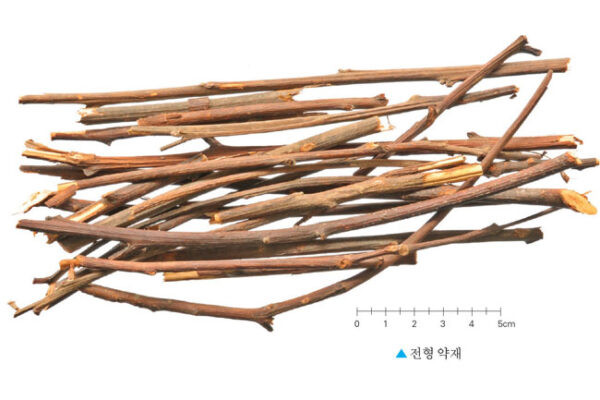Licorice (Licorice root, Glycyrrhiza Radix) Information
| Herb | Licorice root |
|---|---|
| Latin name | Glycyrrhizae Radix |
| Scientific name | Glycyrrhiza uralensis Fischer (감초), Glycyrrhiza glabra Linné (광과감초), Glycyrrhiza inflata Batal (창과감초) |
| Origin | 감초 Glycyrrhiza uralensis Fischer, 광과감초 (光果甘草) Glycyrrhiza glabra Linne 또는 창과감초 (脹果甘草) Glycyrrhiza inflata Batal. (콩과 Leguminosae)의 뿌리 및 뿌리줄기 |
| Properties | Sweet |
| Channels Targeted | Pancrea(脾), Stomach(胃), Heart(心) and Lung (肺), merdians |
| Efficacy | 건비익기(健脾益氣): a therapeutic method to treat spleen qi deficiency by using spleen-fortifying and qi-replenishing medicinals 윤폐지해(潤肺止咳): a therapeutic method of using yin-nourishing and lung-moistening medicinals to treat cough due to lung dryness 완급(緩急): a therapeutic method of relieving spasm, contraction or hypertonicity 청열(淸熱): a therapeutic method of clearing pathogenic heat 해독(解毒): (1) measure to lessen the virulence of pathogens; (2) a method of neutralizing the toxic property of poisons |
| Administration | A cold requiring sweating. Indigestion, vomiting, coughing, etc., caused by coldness in the digestive and respiratory systems |
| Dosage | 4~12g |
| Suitable Constitution | lesser yin person(소음인) |
| Unsuitable Constitution | lesser yang person(소양인) |


Properties and Meridians
- Taste and Temperature: Sweet; neutral
- Meridians: Spleen, stomach, heart and lung.
Efficacy
Licorice root acts on various meridians and is known for its following effects:
- Spleen and Qi Nourishment (補脾益氣): Strengthens the spleen to enhance overall vitality.
- Lung Moistening and Cough Relief (潤肺止咳): Moisturizes the lungs, respiratory system, and skin while reducing cough.
- Pain Relief (緩急止痛): Mitigates sharp pains and soothes mild discomfort.
- Heat Clearing and Detoxifying (清熱解毒): Balances other intense flavors in foods and medicines.
Indications
Licorice is primarily used as a supportive medicinal herb to enhance the effects of other drugs and is not usually used alone for therapeutic purposes. It is beneficial in the following conditions:
- Digestive Weakness: Helps in cases of reduced physical and immune strength due to fluid loss.
- Detoxification: Reduces the toxicity of other herbs, ensuring harmonious action within the body.
Dosage
- Standard Use: Take 2 to 12 grams of thinly sliced or chopped licorice, steeped in boiling water to make a tea.
- For Enhanced Effects: When dried, it aids in detoxification; roasting the herb before use warms its properties, enhancing vitality and digestive health.
Contraindications and Side Effects
Licorice is generally safe but is not recommended for individuals with robust digestive systems or those who suffer from indigestion due to overeating. Traditional medicine advises against its use in conditions characterized by excessive dampness or heat in the stomach.
Pharmacological Role (Prescriptions, Clinical Experience)
Licorice serves as a harmonizing agent in various traditional prescriptions, affecting formulations like:
- Harmonizing Formula (소시호탕): Enhances the nourishing effect.
- Sweat-inducing Prescription (계지탕): Expels body pathogens through sweat.
- Cooling Formula (백호탕): Drives out internal heat. Its role changes with preparation; raw licorice mainly nourishes and moistens, while roasted licorice (known as 炙甘草) warms and invigorates more intensely.
Suitable and Unsuitable Constitutions
- Most Beneficial: Particularly advantageous for individuals with weak digestive systems.
- Precautions: Can be harmful for certain constitutions but may be used when necessary.
Disclaimer
This information is intended for educational purposes only. All medical treatments should be tailored to individual needs. Always consult a healthcare professional before starting any new treatment.
한국어 설명
References
- KMCRIC 생약 up-to-date
- KIOM 본초감별도감 (사진)
- [본초학] 전국한의과대학 본초학공동교재편찬위원회
- [한의학대사전] 한의학대사전 편찬위원회
- [새로 쓴 사상의학] 유주열
- [동의보감]
- [본초비요 本草備要]



